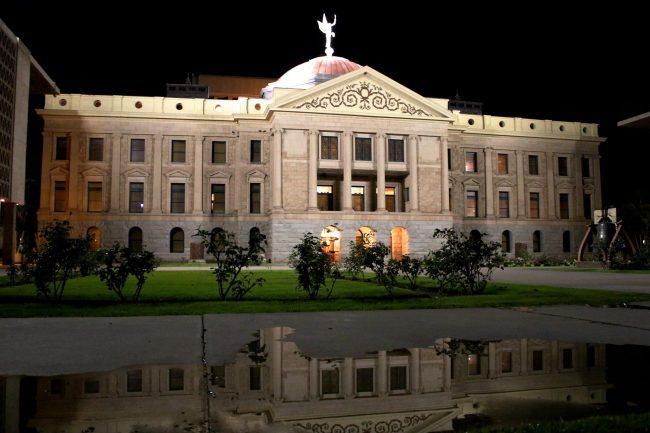The Greater Phoenix Chamber of Commerce (GPCC) announces that its legislative priorities for the Second Regular Session of Arizona’s 53rd Legislature include a structurally balanced state budget, clarifying statutory language on the taxation of digital goods and services and investing in workforce development efforts that position Arizona as a place where employers thrive.
“The Greater Phoenix Chamber’s 2018 legislative priorities reflect the work and focus of the Chamber—we’re focused on growing our economy and ensuring that Greater Phoenix is a region where business can start, grow and expand,” said Mike Huckins, Vice President of Public Affairs. “During session, the Chamber will be advocating for pro-growth policies that place Arizona in a strategic advantage and working with lawmakers to ensure that they understand what the business community needs to create jobs and grow Arizona’s economy.”
Serving as a unified voice for 2,400 member businesses at each level of government, the GPCC public affairs team looks forward to advocating for policies that are pro-business, pro-growth on behalf of its membership:
Structurally balanced state budget
The Greater Phoenix Chamber favors maintaining Arizona’s budget structurally balanced. With anticipated budget shortfalls, GPCC supports a fiscally responsible plan funding vital state services, including education and infrastructure, while maintaining the implementation of business-friendly regulations and pro-growth tax reductions. GPCC is encouraged by the recent federal tax reform and supports state efforts to simplify the tax code and drive economic growth. GPCC urges lawmakers to adopt and follow a fiscal model that is fair, sound, balanced, and promotes job creation and economic vitality.
”In order for Arizona to be competitive in the marketplace and to support economic growth and prosperous communities, our state needs a structurally balanced budget that allows for predictable and consistent funding that is fiscally responsible while providing for vital services such as education and infrastructure,” said president and CEO of the Greater Phoenix Chamber of Commerce, Todd Sanders.
Digital goods and services tax modernization
During the interim, the Greater Phoenix Chamber advocated for the modernization of Arizona’s tax code as it applies to digital goods and services. Huckins testified before the Ad-Hoc committee on the Tax Treatment of Digital Goods and Services and urged lawmakers for clarity and predictability, so businesses can accurately comply with state regulation. The Ad-Hoc Committee finalized a set of recommendations for the legislature to consider this upcoming session that include addressing the following concerns: updating terms related to “digital goods,” defining which digital goods or services may be tax-exempt and clearly defining these goods and services in Arizona’s tax code. GPCC supports these recommendations in order to grow Arizona’s technology sector and provide businesses with legal certainty.
Workforce investments that move the economy forward
The Greater Phoenix Chamber is encouraged by last year’s investment in K-12 and university funding, and looks forward to working with lawmakers to further diversify and increase Arizona’s investment in creating a world-class workforce for all industries.
“The Greater Phoenix Chamber’s economic development team talked to over 900 hundred businesses last year with our partners and by far the biggest issue was workforce,” said Sanders. “As the state’s largest business membership organization, GPCC is focused on helping businesses bridging the skills gap, finding and developing local talent and growing the economy by supporting policies that help businesses grow.”
Specifically, GPCC focuses on convening business and education leaders to work together collaboratively with lawmakers to bridge the skills gap in key Arizona industries. Industry leaders are addressing talent shortages in the Valley and developing action plans to address these issues.
One such shortage is in cybersecurity. “In Arizona, there are 8,500 cybersecurity jobs that we can’t fill. Those jobs have an average annual salary of $48,000,” Sanders said. “We need to move forward and empower people with knowledge and skills so that they can develop and fill these living-wage jobs.”
GPCC applauds and thanks Governor Doug Ducey for emphasizing the need for a diversified talent pipeline that prepares students and adults for a wide-range of career pathways.
For more information on the GPCC’s legislative priorities, please review the 2018 Public Policy Guide.




